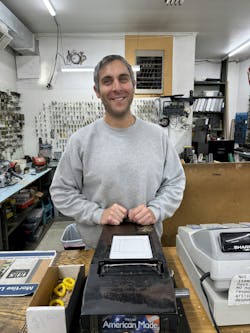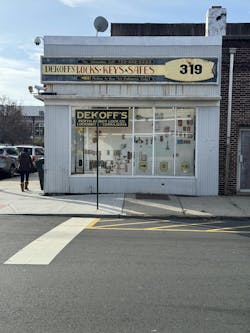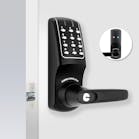When I was asked to talk about multi-family and apartment building locksmithing, I immediately thought of Ian Macotela, owner of Dekoff’s Lock Company in Perth Amboy, N.J. Here’s our conversation.
Locksmith Ledger: Ian let’s begin with some background. How did you get started as a locksmith?
Ian Macotela: It’s a family business, my great grandfather, grandfather, father and now me since 1918. I’ve been doing it my whole life, since I was a kid. This place is where my summer vacations were. I took a break from 1998 to 2002. I was in the military and then I came back to this.
Intercoms are like borderline access control. They have complete control from their cell phone. They can lock tenants out with the push of a button, and we don’t even have to wire the building because everything is Wi-Fi. You’re no longer rewiring an older building, just pop in the unit and you’re done. It’s been a game changer.
LL: Any significant changes you can think of over the years?
IM: The only big changes have had to do with intercom systems. Intercoms are like borderline access control. They have complete control from their cell phone. They can lock tenants out with the push of a button, and we don’t even have to wire the building because everything is Wi-Fi. You’re no longer rewiring an older building, just pop in the unit and you’re done. It’s been a game changer. Access control can get confusing but not with this stuff. It’s very user friendly. If the Wi-Fi were to go down, then there’s key override and the unit is fail-secure so the door would stay locked.
The constant rotation of building management is one. One minute you’re in, the next minute you’re out. New managers like to bring in their own people. You find yourself jumping into other people’s master key systems, etc. Sometimes new management results in problems with getting paid for the work you’ve done.
LL: Do all your employees quickly become familiar with this type of work?
IM: It’s easy for them because it involves lots of repetition. Master keying a building involves going from door to door doing the same thing. If we install new hardware, it’s going to be the same hardware throughout the building. It’s a good way for a new guy to learn quickly. There’s no job too big since you’re doing the same things but on a larger scale.
LL: What about changes in the hardware portion of things?
IM: You want to become familiar with what’s being used in the building. Make sure you’re stocking what you’ll need and you’re ready to go when the calls come in. We also try to steer clear of IC cores when master keying. We get a call in the middle of the night and don’t want to spend too much time coding a new cylinder.
LL: A customer walked in, and I overheard them say that Dekoff’s was the only one on the East Coast doing something. Ian, what were they referring to?
IM: Rebuilding Honda cylinders and ignitions. We don’t specialize in anything in particular. We work on safes, install doors, etc. In the locksmith trade you’re a carpenter, a glazer, a low voltage technician. You’re everything, it’s sink or swim. You’re a car key programmer and a car diagnostician with the tools we have. And you must have a crew that’s willing to go the distance with you.
LL: Do you find yourself training employees on everything once they’re hired?
IM: I do. As long as they show up, we’ll get it done. Two is one and one is none. If you’re just one guy in the shop, it’s impossible to help the customers while running in circles with everything else.
LL: When you agreed to talk with me about multifamily work, I thought of the items you buy from IDN over and over. Are you using them for apartment buildings, like grade 2 knobs and levers for example?
IM: Yes, when I buy door closers and levers, I’m putting the levers on the apartments and the closers for the hallways, etc.
LL: When I started back in the late ’70s, I worked with a guy who’d rap cylinders open, and his pin kit was a coffee can full of silver pins. Working in a shop that’s been around since 1918, have you learned how to be more efficient with knowledge and newer tools?
IM: We did have regular pin kits at the beginning, but things have evolved. Back then it was more common to repair something and now you’re more likely to just replace it. Locksmiths were once considered machinists and would make what they needed. That’s what the ‘smith’ in locksmithing refers to, the metal working. But if you have the choice of buying a grade 2 lever for $46 or spending two hours repairing it, then the choice is obvious.
LL: Are you still servicing buildings that your father and grandfather did?
IM: I’d say that the majority of them died off. We’re dealing with newer buildings, which is why we’re using cylindrical locks and not older mortise locks.
LL: It’s not often that I get to speak with someone running a business that goes back four generations. Looking back and to now, how do you see the industry in the future?
IM: You just have to adapt to the times. With other locksmiths, it’s not a cutthroat competitive situation. Locksmiths are generally willing to help each other out; that’s been my experience. This doesn’t apply to the scammers, but it’s always been that way, and I see it continuing in the future. It’s sad to see that when one of the shops is gone for whatever reason and there’s nobody replacing it. It’s not a dying trade but it does seem like there aren’t that many new shops opening. Even when an employee goes off on their own, it seems like it’s usually them working out of a van as a mobile business.
LL: Getting back to apartment work, do you get calls after hours from tenants?
IM: It’s usually the property manager who’d contact us. We’re just servicing what’s already there. Lots of master keying and continued servicing of the entrance door. Everyone has the same hardware throughout the building. It makes it easy to be prepared no matter what time of day or night they call.
LL: If you could do it all over again, would you choose locksmithing?
IM: Yes. It’s been easier for me because I grew up in it and it’s what I know. I’m comfortable and I can train others. It works. Because there aren’t many shops opening or staying in business, lots of business has funneled my way. I didn’t have to buy anyone out, it just naturally happened this way.
In this business you’re always busy; it’s something new each day. Even if you have these big apartment jobs, you won’t be there for weeks or months like if it was a construction job. You’re in and out and on to the next. Even a monster job doesn’t keep you at one place very long. I think the biggest apartment we did all in one pop was five separate buildings, all new hardware and master key system with about 460 doors. We knocked it out in two weeks.
LL: That’s pretty good. In my experience it’s difficult for locksmiths to get involved in supplying new construction because the hardware is usually part of the entire package. How do you manage to get those opportunities?
IM: I don’t. I tend to shy away from new construction. I’ll do building renovation as well as public housing projects. With new construction jobs, you have to give it away to get it and then worry about getting paid. There are enough apartment buildings around here to keep us very busy.
LL: You mentioned most of what you’re doing involves newer hardware. Are you servicing any buildings that still have older systems like Corbin Russwin, etc.
IM: Yes. We have a building with older Corbin unit locks. We’re pulling apart the entire lock to get to the cylinder. That’s an example of something we installed 80 years ago and are still servicing. We still are able to replace some of the older standard mortise locks when needed.
LL: Are you often asked to come up with the least expensive solution? How does that affect the quality of what you offer?
IM: Many times, the least expensive solution is provided. We don’t want to put in such cheap stuff that we’re going back in a month because it failed. We don’t want to hear later that it’s junk and the knobs are falling off, so you do your best to balance it out. What’s the best you can get at the most economical price?
LL: A locksmith reads this and thinks it would be a good idea to go after apartment building work. What advice do you have for them?
IM: Don’t be afraid of it just because it’s a big job. If you’re master keying one door, there’s no difference between one and 500. It’s just more time and for the most part it’s all going to be the same hardware. Door one and door 500 are getting the same stuff.
LL: In your case, many customers have known and trusted you for years. What do you suggest to others who aren’t as well-known yet?
IM: Good question. I’ve been doing it for so long that my advertising is pretty weak. It wouldn’t hurt to speak with property management companies and explain what you do and ask for a shot at their business. The maintenance man doesn’t care and neither do the tenants. You have to talk with the person who’s responsible for maintaining the building, the property manager.
LL: How have changes in codes like the Americans with Disabilities Act (ADA) affected the work you’re doing?
IM: For a 4-family building we can get away with using knobs but as you get into the larger ones and housing authorities, you need to be ADA compliant. We’re talking levers instead of knobs and door closers as well. It depends on the local authority. Sometimes they want door closers in the apartments and won’t let you use spring hinges.
LL: Do you have customers who try to get away with not complying with certain things?
IM: Yes. I tell them we’ll do whatever you want but when you call back, we have to do it the right way. Some things we just won’t do like putting a double cylinder deadbolt on an apartment door. If it could result in injury or worse, then we won’t do it. If they want an entry knob and the local jurisdiction asks for a storeroom, then we’ll do it and charge them again when we have to come back.
LL: Any good stories to end with after years of working in apartment buildings?
IM: Occasionally we’ll get a call from someone who’s locked out and they ask to have the door unlocked but not to open it. This usually tells us they’re hoarders. When it comes to evictions in the apartment buildings, they don’t need us because there’s a master key system in place. We do evictions for four units and fewer and those are always sad situations.
Steve Kaufman has worked for distributors in the locksmith industry since 1993 and worked as a full-time locksmith from 1978 through the 1980s. Kaufman is the sales manager for IDN Hardware out of its Philadelphia location.
LL: Was the business focused on any particular part of locksmithing, or did you cover the entire gambit?
IM: The whole gambit but because of the location, we’ve always done more commercial and industrial work. There are lots of apartments because the people here are primarily tenants.
LL: What’s the big difference between commercial and industrial work and multifamily housing work? If you were focused solely on apartment buildings, how would you prepare for it?
IM: Apartment work is very routine because there’s the front door entrances where they need a method of entry and then there’s each apartment door and that’s it. You want to become familiar with intercoms. The work is constant because you have maybe 50 individual apartments with one common entry door, and it takes lots of abuse so you’re constantly fixing it. This is especially true if there’s no access control or an intercom because then it’s the mechanical key pulling the door open all day and it’s destroying it.
LL: When you have 50 apartments and one entry door, do you wind up doing the Maison keying where all tenants keys work the front door as well?
Note: A Maison key system is a keying system that permits a lock to be opened with a number of unique, individual keys. Maison key systems are often found in apartment building common areas, such as main entrance or a laundry room where individual residents can use their own apartment key to access these areas.
IM: I typically won’t because then pretty much any key will get you in. There’s a lot of vagrancy in this area so such easy entry could result in several people sleeping in the hallway. For a four-family building I’d do it but not much more than that. They’ll have a separate key for the front door or an intercom system to gain access.
LL: You work with several apartment complexes; how do they vary? Do some have older mortise locks instead of levers and deadbolts?
IM: Different buildings and owners, housing complexes. The front entry doors tend to be storefront type doors. Not many mortise locks, typically we’re working with cylindrical prep.
Steve Kaufman
Steve Kaufman has worked for distributors in the locksmith industry since 1993 and worked as a full-time locksmith from 1978 through the 1980s. Kaufman is the sales manager for IDN Hardware out of its Philadelphia location.







